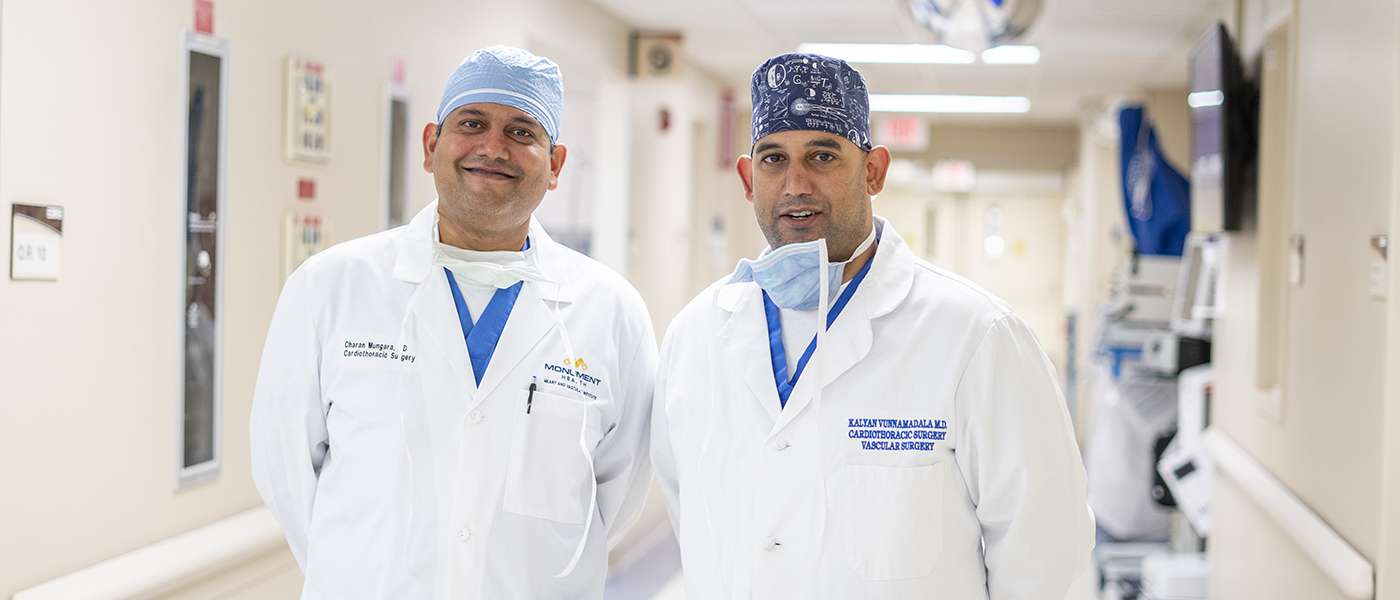The Monument Health Heart and Vascular Institute began as Cardiology Associates PC, Heart Doctors in 1993. It started with five cardiologists who wanted to develop a comprehensive cardiology practice to better meet the needs of their patients. At the time, major procedures meant patients had to travel as far as Denver to receive care. It meant staying in hotels and being away from home, not to mention the stress of a five- or six-hour car ride can be incredibly difficult for patients.
Today, the Heart and Vascular Institute has 20 physicians, 22 advanced practice providers and two electrophysiologists. The physician team includes two cardiothoracic surgeons: Kalyan Vunnamadala, M.D., and Charan Mungara, M.D. Their specialty includes procedures such as coronary artery bypass surgery, lung cancer resection and other procedures inside the chest cavity. More importantly, they are a critical link in the overall program at the Heart and Vascular Institute.
Jacob Staley, Director of Ambulatory Operations at the Heart and Vascular Institute, said, “Without a strong vascular and cardiothoracic surgeon team, all other aspects of the Heart and Vascular Institute are impacted. The surgeons allow the full spectrum of care to be provided close to home – which means that patients get treatment earlier on in disease processes – and achieve better outcomes.”
A patient’s perspective
Show More 
Sergeant Thomas Keller works at the Rosebud Adult Correctional Facility near Mission, South Dakota. One day at work he was lifting weights on the bench press when a weight slipped and landed on his chest. His coworkers called an ambulance who transported him to the Indian Health Service’s Rosebud Unit Emergency Room. He had fractured his sternum and punctured his heart — a condition that would need specialized care.
Thomas was transported by Apollo MedFlight to Monument Health Rapid City Hospital. He was rushed into surgery with Dr. Vunnamadala.
“I thought it was just a cracked rib,” he said. “I didn’t realize it was that serious. When I got to Monument Health they got straight to business.”
After his surgery, Thomas spent four days at Monument Health recovering before going home. “My care was top of the line, and everyone catered to my recovery and comfort while I was there,” he said. “I know without a doubt that Dr. Vunnamadala saved my life. If he hadn’t acted so quickly things could have been very different.”
Small but specialized
Most cardiac hospitals or centers with a similar number of staff as the Heart and Vascular Institute serve a larger population than the roughly 250,000 residents of the western South Dakota region. The small population doesn’t sway Dr. Vunnamadala. “One of the nice things about working here is you can do a little bit of everything and still be good at what you’re doing,” he said.
Dr. Vunnamadala and his colleague Dr. Mungara performed about 500 surgical procedures in the past year. As the only two cardiothoracic surgeons serving western South Dakota, they perfect their skills in a variety of procedures to ensure patients at Monument Health receive world-class care close to home.
The Heart and Vascular Institute has received many awards and recognitions over the years. In 2017, the Heart and Vascular Institute received the distinguished three-star rating from The Society of Thoracic Surgeons for patient care and outcomes in coronary artery bypass grafting procedures. This rating places Monument Health among the most elite for heart bypass surgery in the United States and Canada.
Charan Mungara, M.D., received his medical degree from the University of Mysore in Karnataka, India. He completed his residency in General Surgery and his fellowship in Cardiothoracic Surgery at the University of Wisconsin Hospital & Clinics in Madison, Wisconsin.
Cutting Edge Health Care
Dr. Mungara and his electrophysiology colleagues at the Heart and Vascular Institute are performing a relatively new procedure for persistent atrial fibrillation, or AFib. The two stage procedure is called convergent ablation, and there aren’t many medical teams in the country performing it.
In the first procedure, Dr. Mungara makes a small incision beneath the breastbone. With a scope to guide his work, Mungara reaches to the back wall of the left atrium and burns scars on the unneeded short-circuiting heart tissue.
In the second stage, several weeks later, the electrophysiologist threads a catheter from the groin to the inside of the heart and ablates any tissue not ablated from the outside.
“We’re working from the outside to the inside of the heart, and they’re working from the inside to the outside of the heart, so we meet in the middle,” Dr. Mungara said. The combined procedure has a cure rate in the range of 70 to 80 percent, compared with 40 to 50 percent with other ablation techniques.
Kalyan Vunnamadala, M.D., received his medical degree at St. George’s University School of Medicine in Grenada, West Indies. He completed his residency in general surgery at Easton Hospital in Easton, Pa., where he was also Chief Surgical Resident. He completed his residency in cardiothoracic surgery at the Texas Heart Institute/Baylor College of Medicine in Houston, Texas.
Dr. Mungara and Dr. Vunnamadala are some of the best in their field, and they choose to practice in Rapid City. Rather than selecting one specialty within thoracic surgery, they enjoy performing a variety of operations so they can keep their skills sharp.

